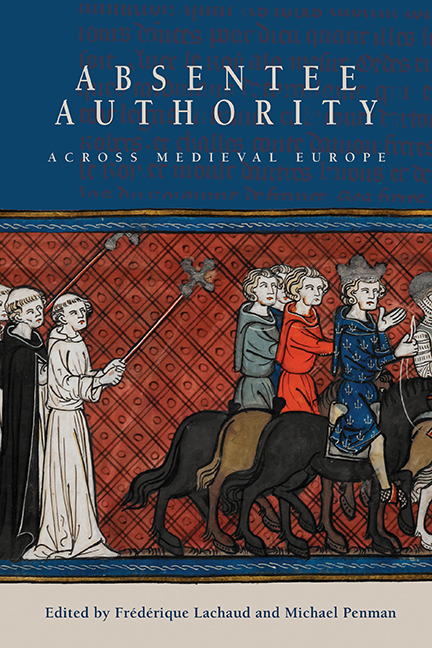Book contents
- Frontmatter
- Contents
- List of Illustrations
- List of Contributors
- Acknowledgements
- List of Abbreviations
- Introduction: Absentee Authority across Medieval Europe
- 1 Incarnating Authority, Exercising Authority: The Figure of the King in the Merovingian Era
- 2 ‘Ubi armae ibi princeps’: Medieval Emblematics as the Real Presence of the Prince
- 3 While the Bishop's Away …: Absentee Bishops of Parma during the Investiture Contest
- 4 An Inconceivable Absence: Usurpers and Illegitimate Rulers in the Genealogical Rolls of the Kings of England, from the Late Thirteenth to the Early Fifteenth Centuries
- 5 Local Loyalty and Absentee Authority in Thirteenth-Century Normandy: The Evidence of the Querimoniae Normannorum (1247)
- 6 Representation and Authority in Thirteenth-Century England and Gascony
- 7 Internal Exiles: Exclusion from the Fourteenth-Century English Court and Kingdom
- 8 ‘Si grant charté a Paris … par defaulté du roy’: Governmental Practice and the Customary Geography of the Absence and Presence of the King in France (1364–1525)
- 9 Was the Couple a Palliative to the Absence of the Prince? The Political Role and Influence of Margaret of Flanders during the Reign of Philip the Bold, Duke and Count of Burgundy (1384–1404)
- 10 Guardian – Lieutenant – Governor: Absentee Monarchy and Proxy Power in Scotland's Long Fourteenth Century
- 11 Absentee Authority in Late Medieval Iceland, as Viewed from the Literary Sources
- 12 Representatives of Kings and ‘Kings’ as Representatives: Authority and its Representation in Professional Groups in Late Medieval and Early Modern France – the Example of the King of Minstrels and of the King of Mercers
- Index
11 - Absentee Authority in Late Medieval Iceland, as Viewed from the Literary Sources
Published online by Cambridge University Press: 16 May 2018
- Frontmatter
- Contents
- List of Illustrations
- List of Contributors
- Acknowledgements
- List of Abbreviations
- Introduction: Absentee Authority across Medieval Europe
- 1 Incarnating Authority, Exercising Authority: The Figure of the King in the Merovingian Era
- 2 ‘Ubi armae ibi princeps’: Medieval Emblematics as the Real Presence of the Prince
- 3 While the Bishop's Away …: Absentee Bishops of Parma during the Investiture Contest
- 4 An Inconceivable Absence: Usurpers and Illegitimate Rulers in the Genealogical Rolls of the Kings of England, from the Late Thirteenth to the Early Fifteenth Centuries
- 5 Local Loyalty and Absentee Authority in Thirteenth-Century Normandy: The Evidence of the Querimoniae Normannorum (1247)
- 6 Representation and Authority in Thirteenth-Century England and Gascony
- 7 Internal Exiles: Exclusion from the Fourteenth-Century English Court and Kingdom
- 8 ‘Si grant charté a Paris … par defaulté du roy’: Governmental Practice and the Customary Geography of the Absence and Presence of the King in France (1364–1525)
- 9 Was the Couple a Palliative to the Absence of the Prince? The Political Role and Influence of Margaret of Flanders during the Reign of Philip the Bold, Duke and Count of Burgundy (1384–1404)
- 10 Guardian – Lieutenant – Governor: Absentee Monarchy and Proxy Power in Scotland's Long Fourteenth Century
- 11 Absentee Authority in Late Medieval Iceland, as Viewed from the Literary Sources
- 12 Representatives of Kings and ‘Kings’ as Representatives: Authority and its Representation in Professional Groups in Late Medieval and Early Modern France – the Example of the King of Minstrels and of the King of Mercers
- Index
Summary
How did royal authority manifest itself on a local level in the Middle Ages? In my book Unpredictability and Presence: Norwegian Kingship in the High Middle Ages, I tried to demonstrate what happened in the king's physical presence in high medieval Norway. My argument was that in spite of a well-developed royal legislation, administration and ideology, kings frequently appealed to a variety of other cultural norms, the most important being their demand for respect in a public political arena highly sensitive to honour and demonstrative gestures. Struggles and negotiations concerning such signs are what medieval sources often circle around.
The next historical challenge lies in retrieving what happened when the king was absent, and how it was possible for him to govern at a distance, considering that norms of obedience were hardly internalized. Late medieval Iceland provides an excellent example for studying absentee authority, since the king never set foot on the island after it became part of Norway in 1262/64. This signalled the end of the king-less Free State period (930–1262/64), and henceforward Iceland was ruled by bailiffs and law men appointed by the Norwegian king. Nordic integration went a step further from 1397, when Denmark, Sweden and Norway formed the Kalmar Union. Iceland now became a Nordic periphery instead of a Norwegian one.
This article will focus on fifteenth-century Iceland. This period has suffered from a particularly bad reputation among Icelandic historians, partly since Iceland was finally hit by the plague (in 1402–4 and 1494–5), partly because the lack of central power led to discord of all kinds, and partly because of the source situation: contemporary sagas were long-since gone, annals were not written after 1430 (until c. 1550), and we retain very few diplomas. Yet, politically speaking, this was a golden century in Icelandic history, as English merchants and fishermen started sailing to Iceland in large numbers, placing the island in midst of a power struggle in the North Atlantic and earning the period the label ‘The English Century’. Moreover, though the period was marked by violence and homicide, these struggles show some regularities that are not concomitant with lawless chaos, as pointed out by Helgi Þorláksson.
- Type
- Chapter
- Information
- Absentee Authority across Medieval Europe , pp. 219 - 239Publisher: Boydell & BrewerPrint publication year: 2017



